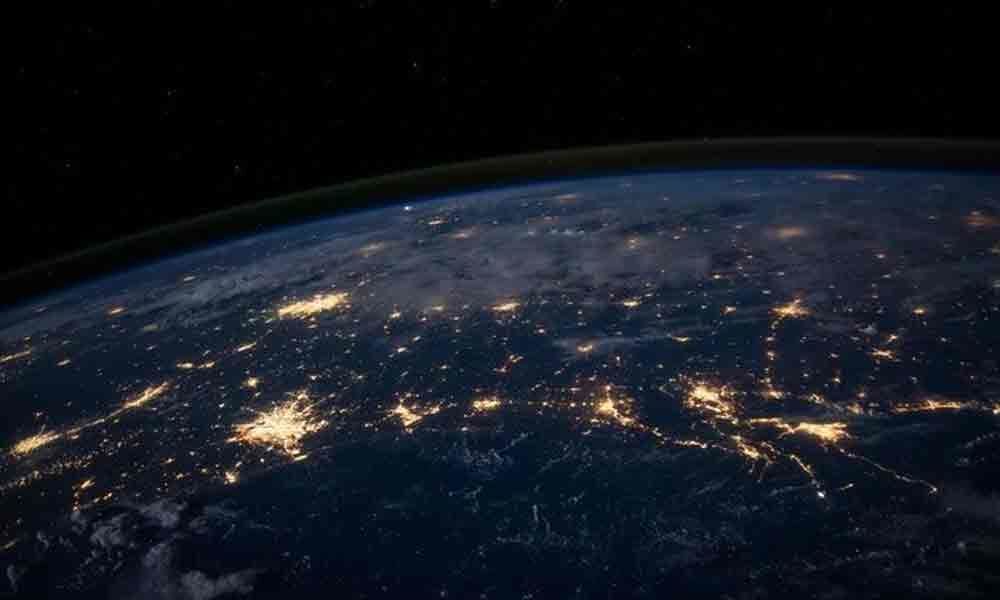Live
- 2.79 lakh MTs of paddy purchased in Eluru dist
- MLA GV Anjaneyulu visits rain-hit agriculture fields
- Cyberabad sees 64 per cent Surge in Crime Rate
- Maternal Deaths: Collector O Anand expresses ire over medical staff
- TTD unveils vision for Global Outreach
- Women should not be confined to homes: CM Naidu
- Xmas bells toll in churches as city glows with festive joy
- Governor, CM extend Christmas greetings
- Beacons of hope and love born on December 25
- Vajpayee’s legacy lives on as country marks his birth centenary
Just In
Planet Earth nourishes all of us


Turning our attention to the most basic condition for our life on this planet — the air we breathe — we see that we cannot be separated from our...
Turning our attention to the most basic condition for our life on this planet — the air we breathe — we see that we cannot be separated from our physical environment. Even if we could manage for some time without food or clothing, we cannot survive more than a few minutes without oxygen.
A vast number of conditions need to come together to yield the uninterrupted supply of oxygen that is indispensable to keep us alive, yet we ourselves make no conscious effort to bring those conditions about. Contemplating this basic fact can spark a sense of wonder and gratitude towards the planet itself. What's more, we ourselves form part of this vast system of symbiotic exchanges.
As trees and plants take in sunlight and carbon dioxide to produce the oxygen that we so vitally require, we are continually reciprocating with carbon dioxide, which plants use as they produce more oxygen. Once we inhale, that oxygen is carried by our blood to cells throughout our body. Thus, we can say that trees and plants and the sun itself are present in our every cell, just as our breath may be present in the plants' cells.
Viewing our place in the world in this way, we see more fully that everything required for us to come into being, all that we turn to in order to define who we are, and everything we need to survive in life is connected to other people and to resources outside of ourselves.
Likewise, we are resources that others depend upon for their existence. Who and what we are is inextricably and reciprocally linked to others. Maintaining this awareness as we live our lives can help us move beyond a merely intellectual understanding of interdependence.
As we increasingly apply this lens to our experiences, the awareness moves from our head to our heart, and we can begin to actually experience ourselves as interconnected. Our observations become the basis for new understanding and new feelings. This in turn can spark a fundamental reorientation towards others and our place in an interdependent world.
Buddhist texts use an analogy to describe the relationship between us living beings and the natural environment. This analogy can also help us see a deeper implication of interdependence. The natural world is described as a container, and all the beings that live in it are described as its contents. This analogy emphasises the inextricable connection of humans, animals, and their natural environment. The planet holds and sustains us. Without it, we would literally fall apart.
When we think of containers, we often overlook the ways in which the contents can affect the container itself — warming or cooling it, staining or bleaching it, stretching or strengthening it and even breaking it.
The word used in Tibetan for 'contents' in this analogy also literally means 'nutrients', such that we ourselves are like the nourishment for the world that contains us. Indeed, the carbon dioxide we exhale nourishes trees and plants, and our bodies also return to the earth and nourish it after we have died. The natural environment, in turn, nourishes us and provides us with the conditions we need for life. What this signals is the close connections of interdependence between us and the world we live in.
Karmapa Ogyen Trinley Dorje

© 2024 Hyderabad Media House Limited/The Hans India. All rights reserved. Powered by hocalwire.com






